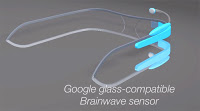 |
| image source |
Nicholas West
Activist Post
It’s no mystery that tech behemoths Microsoft and Google have been developing gadgets for the augmented reality consumer space. Nevertheless, Google Glass has met some resistance over privacy concerns, even reaching the halls of Congress.
If turning the average person into a roving snitch isn’t bad enough, another concern was revealed recently: Google Glass can be hacked and modified for facial recognition capability. Stephen Balaban, founder of Lambda Labs stated his intentions to design an alternate operating system outside the control of Google:
By supplanting Glass’ original operating system, Balaban has already managed to create a feature that can perform facial recognition using the forward-mounted camera.
According to Balaban, Google did not react well when he announced his intention to modify their device to recognize human facial features. In response, the company changed the terms of service to ban the practice, though developers at Lambda Labs seemed undeterred.
“Don’t worry, we think it’s a core feature. Google will allow it or be replaced with something that does,” tweeted Lambda on June 1. (Source)
However, the latest modification could make facial recognition look like child’s play; a compatible brainwave sensor that can evaluate mental state, opening yet another pathway toward a brain-computer interface.
While privacy advocates and Congress are trying to iron out the basic implications of wearable computing and some of the functions that go beyond mere entertainment, a company named Walnut Wearables is trying to bring us closer to “an imminent cyborg future.”
To see the basic features of Google Glass, as well as Microsoft’s concept, please view the videos below:
The Walnut concept goes much further, using a built-in EEG to offer a “window into the mind” – in real time – then connect various mental states to Google Glass functions. The video below shows a scenario featuring a driver who can observe his “focus and attention.”
Certainly this could be a good thing, but with the recent revelations of the ease of hacking Google Glass, as well as unknown backdoors that may or may not be built in, it’s not hard to imagine how this could one day be used to remotely monitor people’s habits and behavior. Think insurance companies, at the most benign.
It’s clear that consumer items like Google Glass (and other augmented reality gadgets) need to be thought through at every level before being fully released into the public domain. However, where there is the will and the funding, it might be inevitable that this technology becomes an integral part of everyday existence.
Google is already talking about directly embedding a chip in the brain. But, for now, it is up to each of us to make the decision whether or not to augment our own reality and make Google Glass “an extension of our mind” . . . then share it with the world.
Read other articles by Nicholas West Here
linkwithin_text=’Related Articles:’


Be the first to comment on "Can Google Glass Be Modified to Read Your Brain?"